2023 in review - Updating Rebuttals and a lot more
Posted on 29 December 2023 by BaerbelW
During most of 2023 we highlighted one updated rebuttal per week, output from our quite productive Rebuttal Update Factory. Cranky Uncle learned a few new languages during the year and we could add several handbook translations. But there was a lot more to keep us busy during the year! As in previous recaps, this one is divided into several sections:
|
Scholary publications, projects and books |
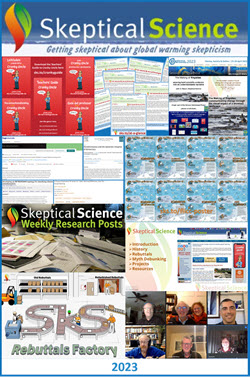 |
Scholarly publications, projects and books
Several members of the SkS-team were lead- or co-authors of peer-reviewed and conference papers published during 2023. Here is a list of some of them:
Misinformation and the epistemic integrity of democracy
Stephan Lewandowsky, Ullrich K.H. Ecker, John Cook, Sander van der Linden and Naomi Oreskes (Lewandowsky et al. 2023). Democracy relies on a shared body of knowledge among citizens, for example trust in elections and reliable knowledge to inform policy-relevant debate. We review the evidence for widespread disinformation campaigns that are undermining this shared knowledge. We establish a common pattern by which science and scientists are discredited and how the most recent frontier in those attacks involves researchers in misinformation itself. We list several ways in which psychology can contribute to countermeasures.
Engaging the dismissive: An assessment of humor-based strategies to support global warming action
Meaghan McKasy, Michael A. Cacciatore, Sara K. Yeo, Jennifer Shiyue Zhang, John Cook, Rhoda Olaleye, and Leona Yi-Fan Su (McKasy et al. 2023). This study aims to understand the influence of mirth, anger, and hope, as elicited by messages with different humor types, on support for global warming action, and the potential moderating role of individual climate concern. Although mirth did not significantly vary across the different stimuli, the analysis found that climate concern moderated the influence of hope on support for global warming actions. The implications of these findings, especially for respondents who were least supportive of actions to combat global warming, are discussed.
Developing an Ad Hominem typology for classifying climate misinformation
Sergei A. Samoilenko and John Cook (Samoilenko & Cook 2023) looked into misinformation produced by various interest groups which is a significant contributing factor to public confusion about climate policy. Character assassination against climate scientists and policymakers is the most common type of misinformation strategy used by contrarians in climate debates.
COVID-19: Conspiracies and Collateral Damage vs Constructive Critique
Stephan Lewandowsky, Konstantinos Armaos, Hendrik Bruns, Philipp Schmid, Dawn Liu Holford, Ulrike Hahn, Ahmed Al-Rawi, Sunita Sah, S., John Cook, Marie Juanchich, and James Ladyman examine the phenomenon of COVID-19 misinformation. They identify similarities between misinformation about COVID-19 or climate change (e.g., how both use the FLICC techniques of denial).
A Physical Explanation for Ocean Air–Water Warming Differences under CO2-Forced Warming
Mark Richardson studied temperature changes near the ocean surface to explain why air and water temperatures might warm differently. Some researchers had proposed that the air warms faster than the water because the water takes longer to heat up, a “heat capacity” effect. Mark’s results show that, in climate models, it is not the heat capacity effect, but a combination of CO2 preferentially heating the atmosphere and enormous increases in evaporation over the ocean. Evaporative cooling is the principle behind sweating, and it limits body temperatures and also ocean water warming. If climate models are correct, then ocean air has warmed more than reported by the main ocean datasets, which use water temperature measurements.
The paper The Cranky Uncle game—combining humor and gamification to build student resilience against climate misinformation, published in Environmental Education Research in 2022 by John Cook & coauthors was awarded the Institute for Information Literacy at Purdue (IILP) 2023 Publication Award for Excellence in Information Literacy Scholarship. The IILP award included $1,000 for recipient authors to share. Cook et al. were sending their earnings straight back into further development of Cranky Uncle, where these funds will be very useful in helping to drive forward with translations, further development and routine maintenance.
In other publication-related news, our paper Quantifying the consensus on anthropogenic global warming in the scientific literature (Cook et al. 2013) "celebrated" it's 10th publication anniversary on May 15. This offered an opportunity to take a look back at some highlights and happenings associated with the paper.
Conferences
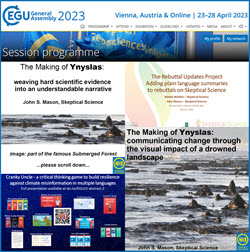 This year's General Assembly of the European Geosciences Union (EGU 2023) took place from April 24 to 28. Bärbel Winkler participated on premise in Vienna and John Mason joined virtually. Both had abstracts in some of the sessions, with Bärbel presenting the Cranky Uncle game in the popular EOS1.3 - Games for Geosciences session, John talking about his book The making of Ynyslas in the virtual poster session part of EOS2.3 - Climate and ocean education: Geoethics, emergency, fossil fuels, war and more, and Bärbel talked about our rebuttals update project in EOS1.1 - Science and Society: Science Communication Practice, Research, and Reflection. To learn more about the EGU 2023 conference, check out Bärbel's diary.
This year's General Assembly of the European Geosciences Union (EGU 2023) took place from April 24 to 28. Bärbel Winkler participated on premise in Vienna and John Mason joined virtually. Both had abstracts in some of the sessions, with Bärbel presenting the Cranky Uncle game in the popular EOS1.3 - Games for Geosciences session, John talking about his book The making of Ynyslas in the virtual poster session part of EOS2.3 - Climate and ocean education: Geoethics, emergency, fossil fuels, war and more, and Bärbel talked about our rebuttals update project in EOS1.1 - Science and Society: Science Communication Practice, Research, and Reflection. To learn more about the EGU 2023 conference, check out Bärbel's diary.
On June 28, Bärbel Winkler participated in the fifth International Conference on Climate Justice hosted by the Jean Monnet Centre of Excellence for Climate Justice. During the conference, Bärbel had the chance to introduce participants to Skeptical Science: Giving facts a fighting chance against (climate) misinformation. Thanks to this presentation, we now have a concise slide-deck to showcase what all we have on offer in addition to a 20-minute long recording of the keynote.
In November, John Cook was invited to give several presentations and to participate in panel discussions in Italy organized by CMCC, the Centro Euro-Mediterraneo sui Cambiamenti Climatici. The trip took him to Rome, Florence and Milan as announced in a short blog post.
Other Publications
As in previous years, members from our team published articles in various other outlets:
Dana Nuccitelli wrote 11 articles for Yale Climate Connections, Stephan Lewandowsky published 3 articles in The Conversation and John Cook 1 article also in The Conversation. Ken Rice published many articles on his " …and Then There's Physics" blog.
Recorded Talks, Podcasts and other outreach activities
Several team member were involved with online talks, presentations and podcasts during 2023. Here is a list of some of them.
| Date | Team member | Title and Link |
| February 24 | Bärbel Winkler | Fighting Disinformation Roadmap eSummit |
| April 28 | John Cook | Columbia Public Health - Turning the Tide: Combatting Misinformation in Public Health |
| May 19 | John Cook | Countering Science Misinformation – A case study of the Great Barrier Reef |
| June 13 | John Cook | Vaccination Acceptance Research Network 2023 conference |
| June 28 | Bärbel Winkler | International conference on Climate Justice - Skeptical Science: Giving facts a fighting chance against misinformation |
| September 28 | Dana Nuccitelli | House Climate Solutions Caucus Briefing on Clean Energy Permitting Reform |
| November 04 | Dana Nuccitelli | Good News for Climate Action |
| November 05 | Dana Nuccitelli | Putting the Inflation Reduction Act's Climate Credits In Action |
| November 16 | John Cook | "The Peel" podcast episode #25 - The Misinformation Machine |
| November 16 | John Cook | CMCC - Foresight Dialogues 2023. Our planet, climate and society |
In December, Melanie Trecek-King - who runs the "Thinking is Power" website - talked with John Cook about the Cranky Uncle game. They discussed both the classic and the vaccine version of the interactive game explaining the techniques and tricks used in science denial.
Projects
Cranky Uncle
During 2023, Cranky Uncle learned 4 additional languages which were launched with the multi-lingual version in three releases: Turkish, Macedonian, Albanian and Finnish. These translations were created by volunteer translator teams scattered around the globe and put together by the professional team of creative agency Goodbeast. The recently updated blog post Cranky Uncle now speaks 12 languages with Finnish added! explains the game's history and goes into fascinating details of what all is involved with these translations and especially the "fun with ambiguities" the translator teams had!
In addition to the game itself, several resources were made available in various languages, all of which are accessible via this overview page. Among these resources is The Teachers' Guide to Cranky Uncle which is now also available in Spanish and Portuguese, with Albanian and Macedonian following soon. All available translations can be viewed and downloaded from this page. Over time, we hope to add more multi-lingual resources for educators around the globe.
The Cranky Uncle Vaccine game, developed with UNICEF, the Sabin Vaccine Institute, and Irimi, was launched in Ghana, Tanzania, and Uganda. Research documenting the co-design process in Uganda, Kenya, and Rwanda will be published in 2024. Three pilot studies were conducted assessing the effectiveness of the game (spoiler alert: the game is effective) with research papers coming out in 2024. To learn more about the vaccine version of the game, you can watch the recording from the Vaccination Acceptance Research Network 2023 conference in Bangkok in June where the game was introduced - with presenters from Australia, Kenya, Uganda, and Pakistan. The Cranky Uncle section starts at 35m50s in.
CARDS - Computer Assisted Recognition of Denial and Skepticism
John Cook has been collaborating with computer scientists at Monash University to further develop CARDS, improving its ability to distinguish between climate misinformation and accurate claims about climate change. They have also developed a model that can detect the fallacies in the FLICC taxonomy. Both these research efforts will be published in scientific journals in 2024. The end goal is to combine both research efforts in order to automatically detect and debunk misinformation in real time - a goal known as the “holy grail of fact-checking”.
Our MOOC Denial101x
Denial101x was again available throughout the year as one long-running self-paced version, attracting around 600 participants. This year's run will be well into 2024, so there's still ample time to work through the lectures if you decide to register now.
Some team activities
John Cook's new position
In early 2023, John Cook accepted a Senior Research Fellow position at the Melbourne Centre for Behaviour Change at the University of Melbourne.
Carbon Brief Quiz 2023
On November 8, we participated again in the annual Quiz Night organized by Carbon Brief. Several teams played at a bar in central London, but many more teams joined online via Zoom or watched via the live stream on Youtube. Over 50 teams and 500 participants joined this fun competition from around the world to tackle the difficult and tricky questions the Carbon Brief team had in store for us. We ended up with 56 out of 100 possible points which surprisingly enough netted us 6th place in the final ranking - an indication just how tricky some of the questions were! Like in previous years this was a fun event to participate in for Bob (Canada), Jim & Kasia (UK), Dana (US), Gavin (UK), Ken (UK) and Bärbel (Germany)! You can read about the event over at Carbon Brief where detailed stats are available as well as all the quiz questions and their answers.
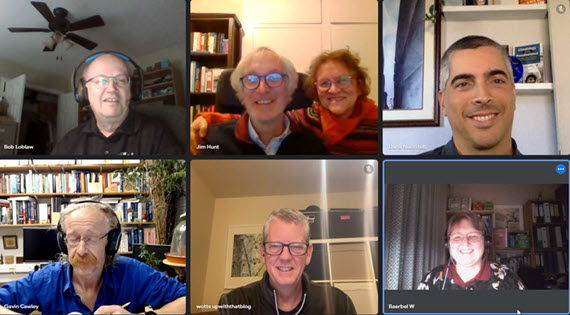
Website activities
Blog posts
Several of our blog series kept getting published throughout the year. John Hartz continued publishing the weekly summaries of articles shared on our Facebook page. On most days, we shared 3 to 6 articles related to climate science and/or tackling misinformation and even though we don't have a calculated number will have shared at least 1,400 articles via that route during the year all told.
Doug Bostrom and Marc Kodack cranked out another 52 editions of our weekly Thursday feature New Research, listing newly published academic research articles as well as high quality government and NGO reports. According to our database, this year in our academic research section we've eyeballed, aggregated and listed 6,755 peer reviewed climate-connected research articles, with at least 42,629 involved investigators and published in 215 journals. Demonstrating both the tight continuity and integration of the overall climate research enterprise as well as climate consilience in plain sight, this year's new reports established their respective new research launching points by citing 360,902 previous works. Nearly 63% of new work this year was available as open access in one form or another, a solid win for climate communications.
Our government/NGO section has included 441 reports from some 323 distinct organizations, all open access given that these organizations are striving to make a difference in the real world.
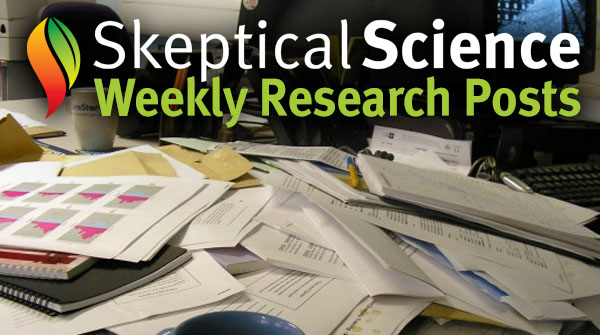
Dana Nuccitelli reposted his articles published in other outlets (see list above) and wrote several original articles for SkS. Evan and John Garrett (jg) published updated versions from their Analogies series. Bärbel Winkler put together several blog posts announcing new or updated resources to help debunk misinformation as well as conference announcements and write-ups. Bob Loblaw contributed a detailed analysis of a flawed paper - A Frank Discussion About the Propagation of Measurement Uncertainty - and The Dynamics of The Green Plate Effect. Ken Rice created an updated version of The Escalator and announced its availability in a blog post: The escalator rises again.
Rebuttals

One of our most ambitious projects to date commenced in February when we started to highlight one updated rebuttal each week on Tuesdays. In the run-up to that, a small team had come up with a game plan of how we could maintain rebuttal updates at a steady pace, churning out one "refurbished" rebuttal per week. As a new feature, each updated basic-level rebuttal now includes an "At a glance" section at the top, to make it as easy as possible to grasp why a given myth is wrong. Most of the initial research and writing has been done by John Mason, with other team members providing feedback before Ken Rice created the drafts on SkS which were then published by Bärbel Winkler as the final "product" coming out of our Rebuttal Updates Factory.
We've been keeping statistics of how often our rebuttals get accessed since January 2017, so have 7 years worth of data by now. During this time, there have been over 40 million views across all available rebuttals with about 3.5 million views in 2023 all told. The ten most viewed rebuttals during the year were (listed via their code and 2022 numbers for comparison): Model (+241K / +192K), Sun (+222K / +176K), Thermo (+218K / +152K), Consensus (+176K / +163K), Past (+149K / +137K), Lag (+125K / +102K), Impacts (+96K / +100K), Antarctica (+102K / +82K), CO2 (+91K / +75K), Saturate (+91K / +68K). For most of them, there were distinctly more views this year compared to 2022 - most likely due to our rebuttal updates project.
Top-10 Rebuttal views 2023 vs. 2022 - click for larger version (includes data up to Dec. 22, 2023)
Translations
Apart from the translations for the multi-lingual version of the Cranky Uncle game mentioned above, translation activities during 2023, coordinated by Bärbel Winkler, were dominated by the various important and very timely handbooks: The Conspiracy Theory Handbook (Albanian and Macedonian), The Debunking Handbook 2020 (Polish), and The COVID-19 Vaccine Communication Handbook (Korean). Some of these translations were created by SkS translator teams while others came about due to generous offers from outside our team.
We can tell from our download statistics that the various handbooks are very popular. Based on available data, The Debunking Handbook was downloaded at least 35,500 times across all available languages with German (15,700+), English (5,900+), Swedish (3,800+), Italian (1,600+), Polish (1,300+), Dutch (1,100+), Spanish (1,100+), and Portuguese (1,000+) making up the bulk of the downloads. The Conspiracy Theory Handbook was downloaded at least 41,200 times with French (4,700+), Swedish (4,300+), Portuguese (4,100+), Hungarian (3,800+), Turkish (2,800+), Albanian (2,800+), Russian (2,200+) and Spanish (2,100+) accounting for more than half of that. In addition, The Consensus Handbook was downloaded at least 4,000 times. Many more downloads will have occured from other websites where we don't have data for.
Together with our German language partner website Klimafakten.de, we published French, Luxembourgish and Polish translations of the FLICC poster in July. This very helpful poster - a successful collaboration between Skeptical Science and Klimafakten. - is therefore now available in 8 languages!
During 2023, we were able to add several rebuttal translations in Macedonian, a new language and therefore another flag to showcase in our banner image. As is usually the case, these Macedonian translations were created and drafted by native speakers of the languange. In order to actually publish them on Skeptical Science, a member of our translator team in Brazil, Luciano Marquetto, volunteered to help. He had already been involved with publishing Portuguese translations so was ideal for the task. A neat case of collaboration across continents and languages!
If you are interested to get involved with our various translation projects, please check out Join the Skeptical Science Translator Community! Is this something up your alley you’d like to help with? If your answer is 'Yes', then please let us know by filling out this short form. Bärbel Winkler will then be in touch to let you know about the next steps, depending on your preferences of where you'd like to get involved.
Social media
In December, we decided to set up our own page on LinkedIn as we noticed that there has been a steady increase of climate-related discussions on the platform and that sharing information from there can be quite effective. Here is the link to our welcome post from where - if you have your own account on LinkedIn - you can start following us.
Our Facebook page has been doing fairly well with around 177,000 followers, but down a bit compared to 2022. We still try to share between 3 and 5 articles per day, selecting content focusing on climate science research or combatting misinformation. We also put together a series of weekly postings, sharing one updated rebuttal (see above) each Tuesday.
| X/Twitter |
On X/Twitter we have ca. 23,700 followers, a slight increase compared to a year ago. Even though we really don't like where X is headed, we decided that our reasoning expressed in last year's blog post still apply and that we'll therefore stay put. Our main reason for this hasn't changed and is outlined in the blog post:
"Skeptical Science’s entire purpose is to combat bunk about climate science. The climate science communications community already does a lousy job of penetrating spaces where it’s most needed. Here’s “most needed” staring us in the face. How does abandoning the field in a war involving a civilian population in harm’s way provide an identifiable net benefit?"
| Bluesky |
To have an escape route already established, should X completely go down the drain, we decided to set up an account on Bluesky which is a bit of a Twitter-look-alike but hopefully with less problematic baggage. You can find us there as @skepticalscience.bsky.social and join our thus far small group of 270 followers. As of this writing, an invite key is needed to set up an account there, but this restriction is supposed to be lifted in the near future.
| Mastodon |
Our presence on Mastodon - where you can find us on the scicomm.xyz instance "tooting" as @SkepticalScience - is evolving quite nicely and we now have about 3,200 followers there.
| MeWe |
Our presence on MeWe, has seen a slight growth during the year and now has more than 1,900 followers. How about joining our other Followers on MeWe to further increase our base there as we head into 2024?
What to expect in 2024?
We have several more languages in the translation pipeline for the Cranky Uncle game and new language versions will become available as they are finalized, so this will be an ongoing process and it should be fun seeing Cranky Uncle "learning" more languages throughout the year!
The rebuttal updates project will continue well into 2024 as we already have several more rebuttals lined up to receive the at-a-glance treatement. Sometime in February, we'll get to the 50th updated rebuttal but we don't yet know which one it'll be. We'll however make sure to let you know when we reach that milestone!
We are also working on an update of the still popular heat widget to include more current data. We had hoped to get this done in 2023 but it turned out that there's more to update than just the plain numbers feeding the widget, so it's unfortunately taking longer than expected.
Website redesign looming ahead!
The design of our website hasn’t changed much since 2007 - and it shows! We have therefore started on a journey for a completely new website. It will not just have a different look and feel but for the first time will be fully responsive to properly display our content regardless of the device you use. Given that we'll need to migrate both content and functionality, we are fairly certain that this project will be with us throughout 2024. We’ll keep you posted on our progress.
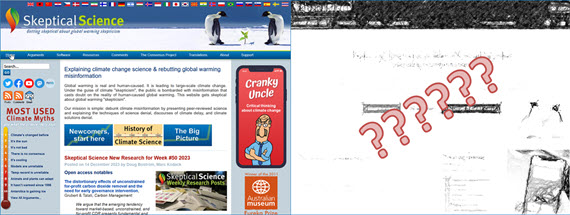
Support the work we do
While we pride ourselves on running a highly efficient "all-volunteer" operation, the technical underpinnings of our internet-based publishing system require money for day-to-day operation as do some of our projects mentioned in this write up. You can help to propel Skeptical Science through another successful year of improving critical thinking skills as outlined below. For US taxpayers squeezing under the wire, contributions to Skeptical Science are tax-deductible.
| Skeptical Science is an all-volunteer organization but our work is not without financial costs. Contributions supporting our publication mechanisms from our readers and users are a critical part of improving the general public's critical thinking skills about science and in particular climate science. Your contribution is a solid investment in making possible a better future thanks to improving our ability to think productively, leading to better decisions at all levels of our climate change challenge. Please visit our support page to contribute. |
Translations of the FLICC-poster
| The FLICC-Poster is the result of a successful collaboration between Skeptical Science and our German partner website Klimafakten. It was first published in May 2020 and has been quite popular in English, German, Dutch, Portuguese, and Spanish since then. The creation of additional translations of the poster requires funding for professional design and layout work. You can contribute to that effort via the form provided on this page. |
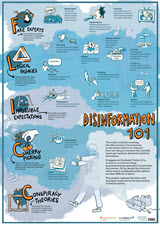 |
Translations of the Cranky Uncle Game
 |
The Cranky Uncle game adopts an active inoculation approach, where a Cranky Uncle cartoon character mentors players to learn the techniques of science denial. Cranky Uncle is a free game available on smartphones for iPhone and Android as well as web browsers. Even though the translations of the Cranky Uncle game are done by teams of volunteers, each language incurs costs for programming activities to get a language set up in the game. If you'd like to support Cranky Uncle "teaching" his science denial techniques in other languages, please use the dedicated form provided on this page to contribute. |
Thanks for reading and all the best for whatever 2024 has in store for us all!































 Arguments
Arguments





















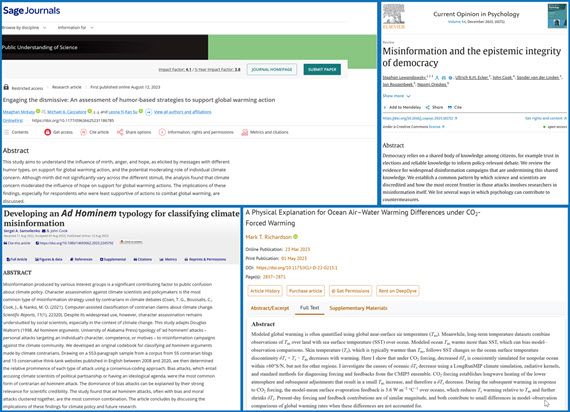

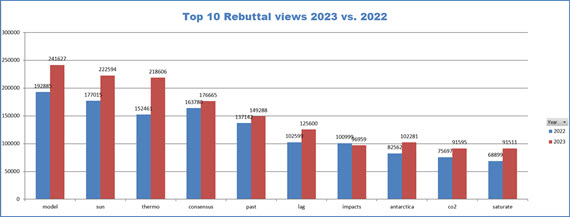
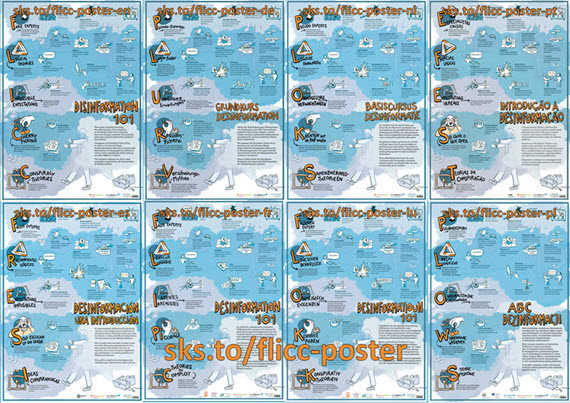









Comments